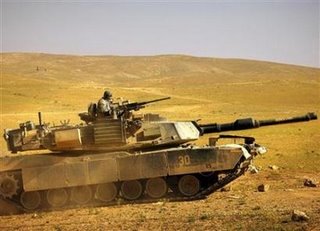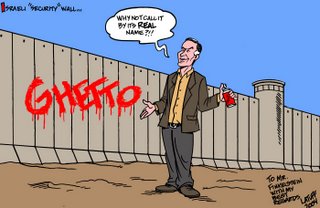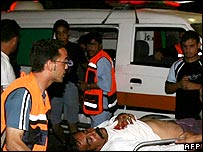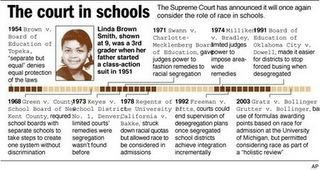 This image released by the U.S. Military in Baghdad, Iraq Thursday, June 8, 2006 purports to show the body of Abu Musab al-Zarqawi, the al-Qaida-linked militant who led a bloody campaign of suicide bombings, kidnappings and hostage beheadings in Iraq, who was killed Wednesday in a U.S. airstrike, Iraq's Prime Minister Nouri al-Maliki announced Thursday, June 8, 2006. (AP Photo/U.S. Military)
This image released by the U.S. Military in Baghdad, Iraq Thursday, June 8, 2006 purports to show the body of Abu Musab al-Zarqawi, the al-Qaida-linked militant who led a bloody campaign of suicide bombings, kidnappings and hostage beheadings in Iraq, who was killed Wednesday in a U.S. airstrike, Iraq's Prime Minister Nouri al-Maliki announced Thursday, June 8, 2006. (AP Photo/U.S. Military)Jun 8,2006
By
PATRICK QUINNBAGHDAD, Iraq (AP) - Abu Musab al-Zarqawi, whose bloody campaign of beheadings and suicide bombings made him the most-wanted terrorist in Iraq, was killed when U.S. warplanes dropped 500-pound bombs on his isolated safe house, officials said Thursday. His death was a long-sought victory in the war in Iraq.
The targeted airstrike Wednesday evening was the culmination of a two-week-long hunt for al-Zarqawi, the leader of al-Qaida in Iraq. Tips from senior militants led U.S. forces to follow al-Zarqawi's spiritual adviser to the safe house, 30 miles outside Baghdad, for a meeting with the terror leader. The adviser, Sheik Abdul Rahman, was among seven aides also killed.
Fingerprints, tattoos and scars
(1) helped U.S. troops identify al-Zarqawi's body, White House spokesman Tony Snow said. The U.S. military released a picture of al-Zarqawi's face after the airstrike, with his eyes closed and spots of blood behind him, an image reminiscent of photos of Saddam Hussein's slain sons from the early days of the war.
"Al-Zarqawi was eliminated," Prime Minister Nouri al-Maliki said.
President Bush, who learned of the deadly airstrike Wednesday afternoon, hailed the killing as "a severe blow to al-Qaida and it is a significant victory in the war on terror."
But he cautioned: "We have tough days ahead of us in Iraq that will require the continuing patience of the American people."
Around the time news reports announced al-Zarqawi's death, two bombs hit a market and a police patrol in Baghdad, killing at least 19 people and wounding more than 40. Police differed on whether the bombs struck shortly before or after the 10:30 a.m. news. Later, a parked car bomb exploded in north Baghdad, killing six people and wounding 15.
Al-Qaida in Iraq vowed to continue its "holy war," according to a statement posted on a Web site.
"We want to give you the joyous news of the martyrdom of the mujahed sheik Abu Musab al-Zarqawi.
"The death of our leaders is life for us. It will only increase our persistence in continuing holy war so that the word of God will be supreme."
Thursday brought two major events for Iraq's new leadership: Shortly after news of al-Zarqawi's death, Parliament approved candidates for ministers in charge of Iraq's army and police, ending a political stalemate between Shiite and Sunni Arab factions.
The new ministers are seen as key to Iraq's taking control of its deteriorating security, and - with al-Zarqawi's death - some Iraqi citizens expressed hope for an end to sectarian bloodshed.
"If it's true al-Zarqawi was killed, that will be a big happiness for all the Iraqis," said Thamir Abdulhussein, a college student in Baghdad. "He was behind all the killings of Sunni and Shiites. Iraqis should now move toward reconciliation. They should stop the violence."
Not since the 2003 capture of Saddam in an underground bunker has the war seen the downfall of such an iconic figure.
The Jordanian-born terrorist, 39, was Iraq's most-wanted militant and nearly as notorious as Osama bin Laden, to whom he swore allegiance in 2004. The United States put a $25 million bounty on his head, the same as bin Laden. Al-Maliki told al-Arabiya television the bounty would be honored, saying "we will meet our promise," without elaborating.
As the leader of al-Qaida in Iraq, Al-Zarqawi oversaw a wave of kidnappings of foreigners and the killings of at least a dozen, including Arab diplomats and three Americans. He personally is believed to have beheaded two Americans - Nicholas Berg of West Chester, Pa., and Eugene Armstrong, formerly of Hillsdale, Mich. - prompting supporters to dub him "the slaughtering sheik."
Al-Zarqawi also was a master Internet propagandist, spreading the call for Islamic extremists to join the "jihad," or holy war, in Iraq. His group posted gruesome images of beheadings, speeches by al-Zarqawi and recruitment videos depicting the planning and execution of its most daring attacks.
His followers also frequently targeted Shiite civilians and mosques in an attempt to spark sectarian civil war, and in his statements, al-Zarqawi - a Sunni Arab - often vilified Shiites as infidels.
Just days before his death, Al-Zarqawi issued an audiotape on the Internet, railing against Shiites in Iraq and saying militias were raping women and killing Sunnis. He urged the community to fight back.
Elated at news of his killing, Iraqi police in Baghdad's Shiite slum of Sadr City fired their guns in the air and chanted. Other Iraqi citizens had mixed reactions.
U.S.-led forces came close to capturing al-Zarqawi several times since his campaign began in mid-2003. But Gen. George Casey, the top U.S. commander in Iraq, said the latest hunt began two weeks ago with intelligence from senior leaders of al-Zarqawi's network.
U.S. military spokesman Maj. Gen. William Caldwell said U.S. and Iraqi intelligence found al-Zarqawi by following his spiritual adviser, who visited al-Zarqawi at the safe house, prompting the airstrike. He showed a videotape of an attack in which he said F-16 fighter jets dropped two 500-pound bombs on the site.
"We had absolutely no doubt whatsoever that Zarqawi was in the house," Caldwell said, adding that Iraqi and U.S. troops carried out 17 raids around Baghdad after al-Zarqawi's killing.
The safe house was located in a remote area 30 miles from Baghdad in the volatile province of Diyala, just east of the provincial capital of Baqouba, officials said.
Baqouba has in recent weeks seen a spike in sectarian violence, including the discovery of 17 severed heads in fruit boxes. It also was near the site of a sectarian atrocity last week in which masked gunmen killed 21 Shiites, including a dozen students pulled from minibuses, after separating out four Sunni Arabs.
"Those who disrupt the course of life, like al-Zarqawi, will have a tragic end," the Iraqi prime minister said. He warned those who would follow the militant's lead that "whenever there is a new al-Zarqawi, we will kill him."
"This is a message for all those who embrace violence, killing and destruction to stop and to (retreat) before it's too late," he said. "It is an open battle with all those who incite sectarianism."
Al-Maliki said tips from area residents helped lead to the airstrike. A Jordanian official said the kingdom also gave the U.S. military information on tracking down al-Zarqawi, who claimed responsibility for the triple suicide bombing of hotels in Jordan's capital, which killed 60 people - mostly Sunni Muslims. The attack drew condemnation from the Arab world, including Islamic militants.
The official, who spoke on condition of anonymity because he was addressing intelligence issues, said some of the information came from Jordan's sources inside Iraq and led the U.S. military to the Baqouba area.
Iraqi Foreign Minister Hoshyar Zebari told The Associated Press that a serious effort to find al-Zarqawi had been under way since he appeared in a videotape in late April - the same week messages were broadcast by bin Laden and his top deputy, Ayman al-Zawahri. He said the location where al-Zarqawi appeared in the videotape had been "pinpointed," without elaborating.
A U.S. defense intelligence official, who requested anonymity while events were unfolding, said there is no intelligence indicating that extremists planned attacks that would be triggered by al-Zarqawi's death.
However, his death might bring retaliation, he said.
It was not clear to American authorities who would succeed al-Zarqawi. The official noted that a number of al-Zarqawi deputies have been killed in recent months, which could cause chaos among the group's top tier.
Caldwell, the U.S military spokesman, said an Egyptian-born man he identified as Abu al-Masri will probably take over al-Qaida in Iraq.
In London, British Prime Minister Tony Blair said al-Zarqawi's death "was very good news, because a blow against al-Qaida in Iraq was a blow against al-Qaida everywhere." Afghan President Hamid Karzai called the killing "a significant step in ridding the world of the menace of terrorism."
In Jordan, al-Zarqawi's older brother said the insurgent leader was a martyr.
"We anticipated that he would be killed for a very long time," Sayel al-Khalayleh told The Associated Press by phone from Zarqa, the town from which al-Zarqawi derived his name. The family renounced him in the wake of the Amman bombing.
---
Associated Press reporter Katherine Shrader in Washington contributed to this report.
More PicturesLinks:Al Qaeda release a press statement regarding the death of Al Zarqawi. Go
HERE to read a rough translation and view the origional Arabic statement.
Airstrike videoAl-Zarqawi killed in air strikeObituary: Abu Musab al-Zarqawi (1) In Islam it is Haram to have tattoos, for anyone who has them it is believed they will not see Paradise and I seriously doubt Al-Zarqawai had any. I know in later news reports he was said to be identified by his teeth and fingerprints.
If people are going to get their propaganda right please at least learn something about the culture you are insulting.






































